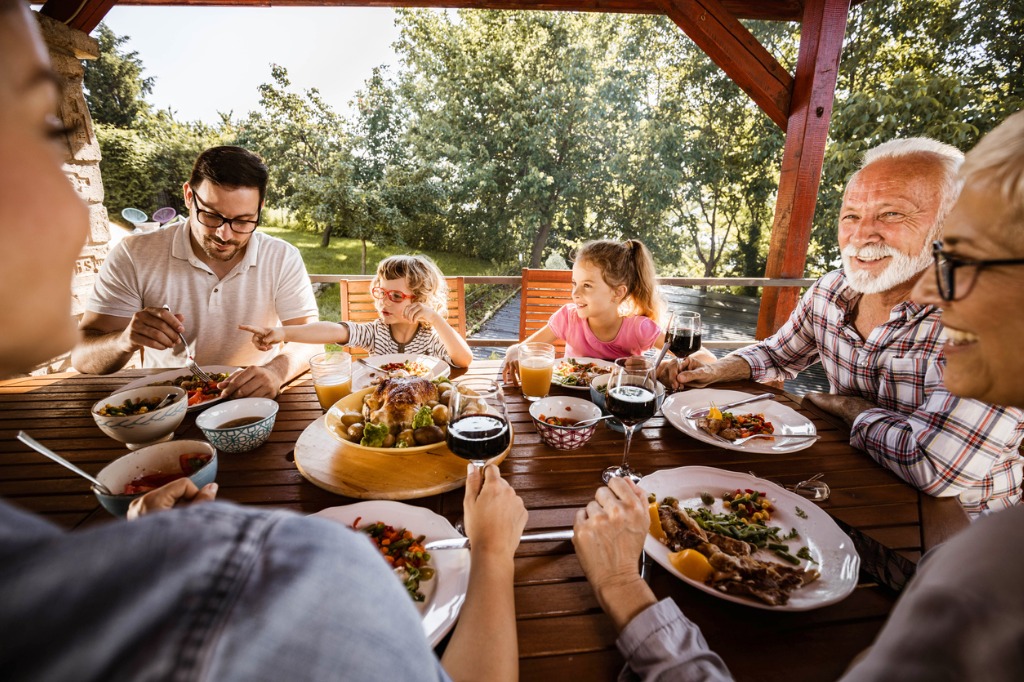As the temperatures dip and the days grow shorter, there’s nothing like a comforting meal…
The Importance of Eating Together as a Family

At Kate’s Kitchen, we’ve always believed that regularly sitting down to eat and spend time together as a family is key to building strong, supportive family relationships with our family members. And since it’s generally a good practice to examine our beliefs and make sure that our intentions match with our goals, we decided to do some research to make sure that our instincts were correct.
The results? We were incredibly right—and now we know eight science-based reasons why it’s so important to eat together as a family!
8 Benefits of Eating Together as a Family
Better Eating Habits
Eating with one or more family members correlates with an overall better diet for children, especially for adolescents. Teens who eat with family are more likely to eat more servings of fruits and vegetables and less fast food and sugar-sweetened drinks.
Tip: Teaching your children how to cook has a similar benefit. Kids who know how to make simple meals by themselves are less likely to snack on less healthful foods.
Better Attitudes Towards Food
Modeling healthful eating habits at the table has a significant impact on children and teens’ psychological development surrounding food. Children and teens who frequently participate in family dinners have fewer instances of eating disorders, alcohol and substance use, violent behavior, depression, and other serious issues later on in adolescence.
Improved Self-Esteem
Giving children the validation of listening to them talk about their day and affirming the good choices they make can help them build confidence in themselves and their worth as people. Showing them that you respect and value them and their time teaches them to expect similar treatment from others and to remove themselves from situations where they feel disrespected or like they aren’t being valued.
Tip: Part of respecting kids is asking them to help with things that are within their abilities, like setting the table, serving food, or cleaning up. This teaches them to reflect the respect they are given back to others in kind.
 Better Communication Skills
Better Communication Skills
One of the most effective ways to improve communication skills is by regularly practicing communication skills! It’s shocking but true…
Regularly talking with your kids about how their days went, what they’re excited about learning in school, or even what they thought about the new superhero movie can easily translate over time into improved logic, reason, rhetoric, and even public speaking and improv skills!
Improved Resilience
Regular family contact allows you the opportunity to provide informal parental guidance, and regularly scheduled events like eating together as a family make a convenient open space for kids to bring up any issues they want to talk about.
This means you’re more likely to find out about any problems your kids are having when the problem is still small and easier to manage than after they’ve been struggling for a while and the problem has become more serious and difficult to deal with.
Get to Know Each Other
Yes, you’re technically all stuck in this family together (that’s what being a family means), but how well do you really know each other? Any relationship takes effort to maintain at a high level, even when those relationships are with the people in your own family. Spending time together is an important investment in your family and demonstrates that you’re willing to show up for each other.
Tip: Even the moodiest of moody tweens can often be coaxed out of their bedroom and convinced to remove their earbuds for an hour if tempted with food (they do have to eat, right? One of the experts we read definitely said they have to eat…).
Healthy Coping Skills
Kids think their parents are the best people in the world and have no flaws—and who can blame them? You’re great!
It can come as a surprise as they get older and start to realize that you also have problems and fears, just like anyone else. This realization can be extremely concerning for young kids and one of the best ways to head it off is by being honest with your kids about the struggles you’re having in your own life.
For example, if you’re working on a stressful project at work, let your kids know you’re stressed about work. They’ll probably be supportive and validating, just like you are with them!
Making Memories
It seems like an afterthought to put it here at the end of the list, but bonding and making memories with your family over shared meals is really the whole point. The food itself doesn’t matter nearly as much as the quality time.
No one is going to remember whether your best ever Sunday dinner was meatloaf and mashed potatoes or chicken alfredo and garlic bread: what they’re going to remember is being together and feeling loved and supported as a family.
How Do You Get These Benefits?
- Experts from multiple studies tend to agree one or two meals together each week is a good minimum.
- Cook together.
- Spend your time together fully present and focused on each other, without distractions like phones, work, or homework at the table.
- Make sure everyone has a chance to talk about themselves and connect with each other.
Eat Together as a Family (as Part of Our Family) at Kate’s Kitchen
If family dinners don’t fit in with your family’s hectic evening schedules, you can still get all the same benefits we discussed above by eating any meal together as a family. Come on down to Kate’s for breakfast on the weekend—or before school—to get filled up for the day and caught up with everything going on with your kids lately!
Whether you want to have an all-American breakfast, French toast, waffles, an omelet, a Benedict, scramblers, or even a breakfast quesadilla, Kate’s has a breakfast-match to suit the flavor preferences of everyone in your family, all in one place.
Take a look at our breakfast menu!
Give us a call if you want to place a to-go order!
Kate’s Kitchen… (816) 436-7200
Ronnie’s Restaurant… (913) 831-8600



